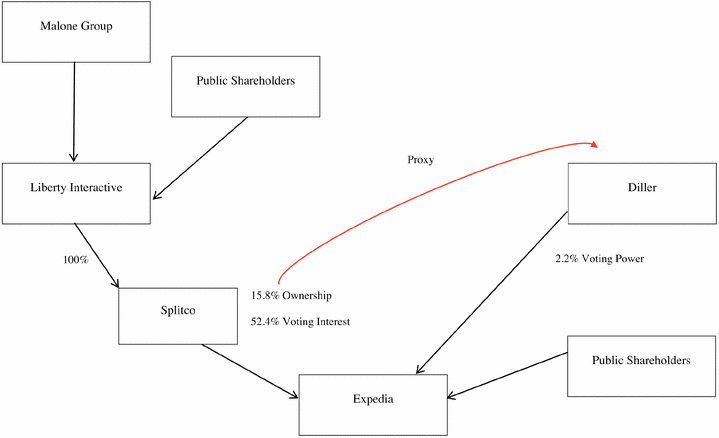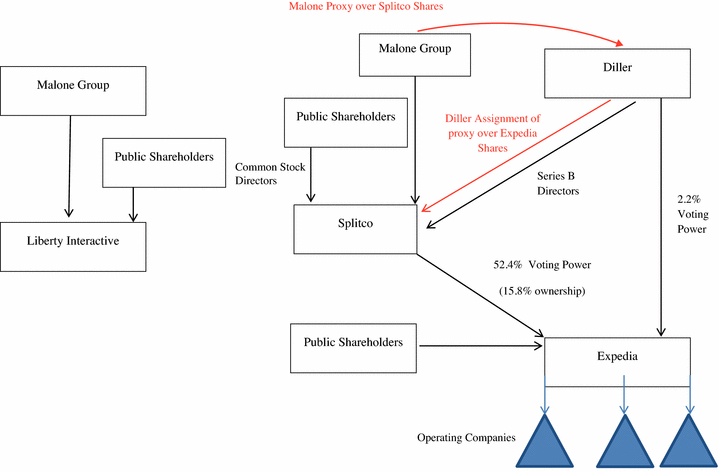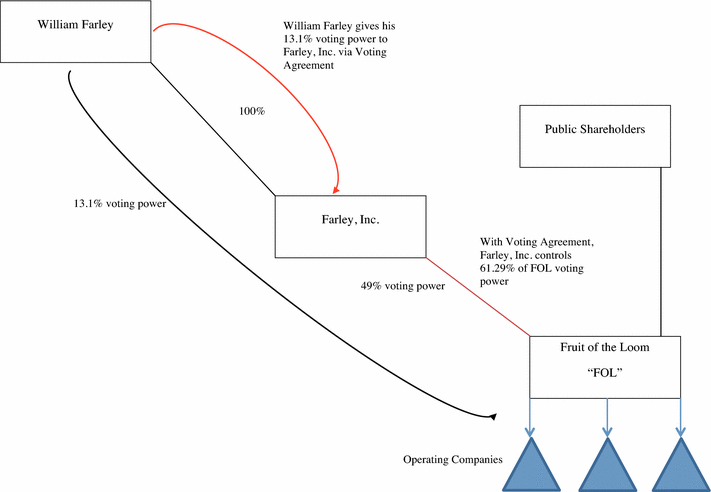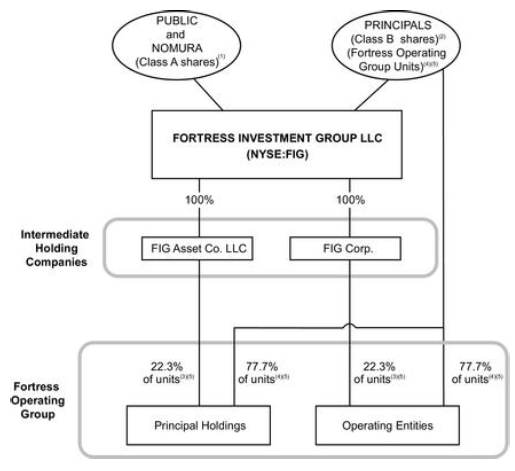
| 30 ROCKEFELLER PLAZA
NEW YORK, NEW YORK
10112-4498 TEL +1 212.408.2500 FAX +1 212.408.2501 BakerBotts.com | AUSTIN BEIJING BRUSSELS DALLAS DUBAI HONG KONG HOUSTON | LONDON MOSCOW NEW YORK PALO ALTO RIYADH SAN FRANCISCO WASHINGTON |
August 15, 2016
Via EDGAR
Mara L. Ransom
Assistant Director
Office of Consumer Products
U.S. Securities and Exchange Commission
100 F. Street, N.E.
Washington, D.C. 20549-3628
Re: Liberty Interactive Corporation
Amendment No. 1 to Preliminary Proxy Statement on Schedule 14A
File No. 001-33982
Liberty Expedia Holdings, Inc.
Amendment No. 2 to Form S-1 on Form S-4
File No. 333-210377
Dear Ms. Ransom:
We are in receipt of your comment letter dated July 29, 2016 in which you asked us to explain how Expedia, Inc. (“Expedia”) will be a majority owned-subsidiary of Liberty Expedia Holdings, Inc. (“Splitco”). All section references in this response letter are to sections of the Investment Company Act of 1940 (the “Act”).
As you are aware, Section 3(a)(1)(C) defines an investment company to include any issuer which is engaged or proposes to engage in the business of investing, reinvesting, owning, holding or trading in securities, and owns or proposes to acquire investment securities having a value exceeding 40% of the value of its total assets (exclusive of Government securities and cash items) on an unconsolidated basis.
Section 3(a)(2) defines “investment securities” to include, among other things, all securities except securities issued by majority-owned subsidiaries of the owner which (i) are not investment companies and (ii) are not relying on the exception from the definition of investment company in Section 3(c)(1) or 3(c)(7).
Section 2(a)(24) defines “majority-owned subsidiary” of a person as a company 50% or more of the outstanding voting securities of which are owned by such person, or by a company which, within the meaning of such definition, is a majority-owned subsidiary of such person.
Section 2(a)(42) defines “voting security” as any security presently entitling the owner or holder thereof to vote for the election of directors of a company and goes on to state that a specified percentage of the outstanding voting securities of a company means such amount of its outstanding voting securities as entitles the holder or holders thereof to cast said specified percentage of the aggregate votes which the holders of all the outstanding voting securities of such company are entitled to cast.
Prior to the completion of the transactions described in the preliminary proxy statement and the registration statement referenced in the caption above, Diller’s existing proxy rights with respect to Expedia common stock will be assigned to Splitco along with the assignment of certain existing agreements among Liberty Interactive Corporation (“LIC”), Diller and Expedia regarding the governance of Expedia (the “Expedia Governance Arrangements”). Expedia currently has 14 directors. Four Expedia directors are elected by the holders of the common stock of Expedia (voting as a separate class) with respect to which Splitco has approximately 7.9% of the vote. Ten Expedia directors are elected by holders of common stock and Class B common stock of Expedia voting as a separate class; Splitco has approximately 52.4% of the combined vote of the common stock and Class B common stock. Therefore, as a result of the Expedia Governance Arrangements, Splitco will be able to elect a majority of Expedia’s directors and Expedia will be a “majority-owned subsidiary” of Splitco as defined in Section 2(a)(24). (See Exhibit A-1 and Exhibit A-2)
Prior to the completion of the transactions described in the preliminary proxy statement and the registration statement referenced in the caption above, Splitco, LIC, John C. Malone, Leslie Malone and Barry Diller (“Diller”) will enter into certain agreements regarding the governance of Splitco (the “Splitco Governance Arrangements”). The Splitco Governance Arrangements will establish the composition of the Splitco board of directors and how the board of directors of Splitco will direct Splitco’s vote with respect to the election of Expedia directors. Splitco’s board of directors will consist of five common stock directors (the “Splitco Common Stock Directors”) and two Series B directors (the “Splitco Series B Directors”). The Splitco Common Stock Directors will be elected by the owners of Splitco Series A common stock and Splitco Series B common stock (but with the Splitco Series B common stock casting only two votes per share rather than ten) and the Splitco Series B Directors will be elected by the holders of Splitco Series B common stock, of which Diller will have approximately 90% of the voting power through a proxy from Mr. Malone. Splitco Common Stock Directors will direct Splitco’s vote with respect to three Expedia Directors which are designated by Splitco pursuant to the Expedia Governance Arrangements. Splitco Series B Directors will direct Splitco’s vote with respect to the Expedia directors elected by the holders of Expedia common stock and the remaining seven Expedia directors.
Splitco is organized as a Delaware corporation and, as is the case for all Delaware corporations, decisions will be made on behalf of Splitco by its board of directors. Under Delaware corporate law, when Splitco’s directors make decisions on behalf of Splitco, they must exercise their fiduciary duties of care and loyalty.(1) Furthermore, when the Splitco directors, including the directors initially appointed by Diller, exercise those duties, they must take into account the best interests of all Splitco stockholders, not just the interests of Diller.(2) Accordingly, when the Splitco directors elected by Diller determine how Splitco will vote its Expedia stock with respect to the election of Expedia directors and how Splitco will exercise its rights under the Expedia Governance Arrangements, they will do so on behalf of Splitco and all of its stockholders.
The fact that Diller can elect the directors of Splitco who will determine how Splitco votes with respect to the election of certain Expedia directors and exercises its rights under the Expedia Governance Arrangements does not change the fact that Splitco directors, acting in the best interest of Splitco and all of Splitco’s stockholders, will exercise those rights, not Diller. As a result, Splitco (and not Diller) controls the voting of Expedia stock owned by Splitco and the exercise of Splitco’s rights under the Expedia Governance Arrangements. To conclude that the presence of
(1) DAVID A. DREXLER ET AL., DELAWARE CORPORATION LAW AND PRACTICE, §15.02 (2015).
(2) WELCH, SAUNDERS, LAND, & VOSS, FOLK ON THE DELAWARE GENERAL CORPORATION LAW, §141.02(7) (2016).
2
a stockholder, like Diller, who can influence how a holding company, like Splitco, will vote the stock of its subsidiaries makes the holding company an investment company for purposes of Section 3(a)(1)(C) would require any number of publicly owned holding companies to register as investment companies under the Act. Our research has failed to find any other case in which the Securities and Exchange Commission or its staff (the “Staff”) has ignored corporate formalities and concluded that a majority stockholder of a holding company is the de facto owner of the voting securities of the holding company’s subsidiaries and that, as a result, the holding company is an investment company. Furthermore, such a conclusion is not necessary to achieve the public policy objectives of the Act.
For example, in the Farley, Inc. (“Farley, Inc.”) SEC Staff No-Action Letter,(3) William Farley, an individual (“Farley”), owned 100% of the outstanding common stock of Farley, Inc., which controlled approximately 62.1% of the voting power of Fruit of the Loom, Inc. (“FOL”), a public holding company, via a voting agreement in which Farley gave Farley, Inc. the right to vote his 13.1% of voting power in FOL. Coupled with Farley, Inc.’s own 49% voting power, Farley indirectly controlled 62.1% of the voting power of FOL. (See Exhibit B) The Staff did not view Farley, Inc. as an investment company even though Farley could elect 100% of Farley, Inc.’s board of directors and its primary asset was FOL common stock. The Staff also did not take the view that, because Farley indirectly could elect a majority of the board of directors of FOL and indirectly the subsidiaries of FOL, that FOL was an investment company for purposes of Section 3(a)(1)(C).
Fortress Investment Group LLC (“FIG”) is another example of a public company which has a similar structure to that of Diller, Splitco and Expedia. When FIG completed its initial public offering in 2007, the principals of FIG controlled 77.7% of the total combined voting power of FIG. (See Exhibit C) As disclosed in FIG’s S-1 filed on February 2, 2007, FIG controlled two subsidiary holding companies, FIG Asset Co. LLC and FIG Corp. and indirectly controlled the operating companies below those holding companies via general partner interests owned by the two holding companies. The Staff did not take the view that FIG was an investment company because the Fortress principals controlled 77.7% of the voting securities of FIG and therefore could indirectly control the election of directors (or the general partners) of FIG’s subsidiaries.
Any number of similar examples could be given: Alibaba Group Holding Limited, Blackstone Group LP, GAMCO Investors, Inc. and Och-Ziff Capital Management Group LLC come to mind.
The Staff has never treated these holding companies as investment companies because it is not necessary to do so to achieve the statutory purpose of Section 3(a)(1)(C). The purpose of Section 3(a)(1)(C) is to distinguish between companies primarily engaged in operating businesses, directly or indirectly through subsidiaries, and those primarily engaged in the
(3) Pub. avail. April 15, 1988.
3
business of investing in securities. The drafters of the Act determined(4), and the Act on its face states, that majority ownership of the voting securities of a subsidiary engaged in an operating business is sufficient evidence to conclude that a holding company is not engaged in an investment business with respect to those securities and, instead, it is a holding company that intends to engage in an operating business through its control of the subsidiary. The sole exception to this rule is where the holding company intends to primarily profit from the purchase and sale of a majority voting security position (the so-called “special situation investment company doctrine”). The ability of an individual or small number of persons to influence the election of the directors of a holding company, which directors, in turn, control how that holding company votes securities issued by its majority-owned subsidiaries provides no evidence that the holding company primarily intends to profit from the purchase and sale of its subsidiary’s securities. As evidenced by the examples above, quite the opposite is true. Individuals often retain primary control of publicly-owned holding companies that engage in one or more operating company businesses through majority-owned subsidiaries.
Splitco does not own its Expedia shares for the primary purpose of profiting from their sale. In fact, the primary purpose of the Splitco Governance Arrangements and the Expedia Governance Arrangements is to ensure that Splitco will be able to elect a majority of the directors of Expedia, who in turn will control how Expedia conducts its operating business, and that Diller will have a controlling influence over Splitco. As a result, Splitco is not an investment company primarily seeking to profit from the purchase and sale of Expedia securities and is instead a bona fide holding company for purposes of Section 3(a)(1)(C).
The Staff cited to William L. Eddleman, Jr. SEC Staff No-Action Letter (Oct. 26, 1979) and Wells Fargo Alternative Asset Management LLC, SEC Staff Interpretative Letter (Jan. 26, 2005) for the proposition that the definition of “voting security” in Section 2(a)(42) includes not only the formal legal right to vote for the election of directors but also the de facto power, based on all the surrounding circumstances, to determine or influence the determination of, the identity of an issuer’s directors. Eddleman addressed whether or not persons who intended to acquire more than 5% of the common stock of an issuer could avoid becoming affiliated persons of the issuer by putting their common stock in voting trust or by instead acquiring debt securities that would convert into more than 5% of the common stock of the issuer in order to evade being an affiliated person of the issuer subject to the Act’s prohibitions against transactions between registered investment companies and their affiliated persons. The Staff rightly interpreted the definition of “voting security” to include not only the formal ability to vote but also the de facto
(4) See, e.g., Hearings on S. 3580 Before a Subcomm. of the Senate Comm. on Banking and Commerce, 76th Cong. 177 (1940) (statement of David Schenker, Chief Counsel to the Investment Trust Study: “We are not even remotely interested in holding companies.”). See also Aldred Inv. Trust v. SEC, 151 F.2d 254, 260 (1st Cir. 1945), cert. denied, 326 U.S. 795 (1946) (“An investment company is essentially a liquid aggregation of capital consisting of public savings turned over to the company for investment in productive enterprise. It normally invests for the yield as distinguished from the control of productive enterprise and along such lines it is to be distinguished from the holding company.”).
4
power to influence the vote in order to uphold the provisions of the Act that prohibit persons with an ability to affect the management of an investment company from overreaching the investment company to benefit themselves. If Expedia were an investment company (which it is not), the Staff could achieve the same investor protections by concluding Diller is an indirect control person of Expedia and therefore an affiliate of Expedia for purposes of Section 17.(5)
The fact that Diller can elect directors of Splitco that, in turn, will determine how Splitco votes its Expedia shares provides no evidence that Splitco’s primary business purpose is to profit from the sale of its Expedia shares instead of its actual business purpose, which is to be a traditional holding company. Therefore there is no reason for the Staff to ignore corporate formalities to conclude that Diller is the de facto owner of Splitco’s Expedia shares and that Splitco is an investment company. Accordingly, we respectfully submit that neither the Eddleman letter nor the Wells Fargo letter stands for the proposition that a holding company with one or more majority-owned subsidiaries is an investment company if an individual has the ability to elect the directors of the holding company who will determine how the holding company votes its subsidiaries’ shares.
If you have any further questions after you have reviewed this response, we would suggest scheduling a teleconference to attempt to resolve any remaining open issues. Please contact the undersigned at 212-408-2503.
| Sincerely, |
| |
| /s/ Renee L. Wilm |
| |
| Renee L. Wilm |
(5) Wells Fargo did not present such an interpretive issue. Although it cited to the Eddleman language, in Wells Fargo the Staff essentially confirmed to the drafter of the letter that units of interest in a trust that had no voting power to elect the trustee or managers of the trust and no indirect power to influence the selection of such persons were not voting securities based on the facts presented in the letter.
5
Cc: Richard N. Baer
Liberty Interactive Corporation
Michael K. Hoffman
Skadden, Arps, Slate, Meagher & Flom LLP
6
Exhibit A-1
Pre-Split-Off

A-1
Exhibit A-2
Post-Split-Off

A-2
Exhibit B
Farley, Inc.

B-1
Exhibit C
Fortress Investment Group LLC

C-1



